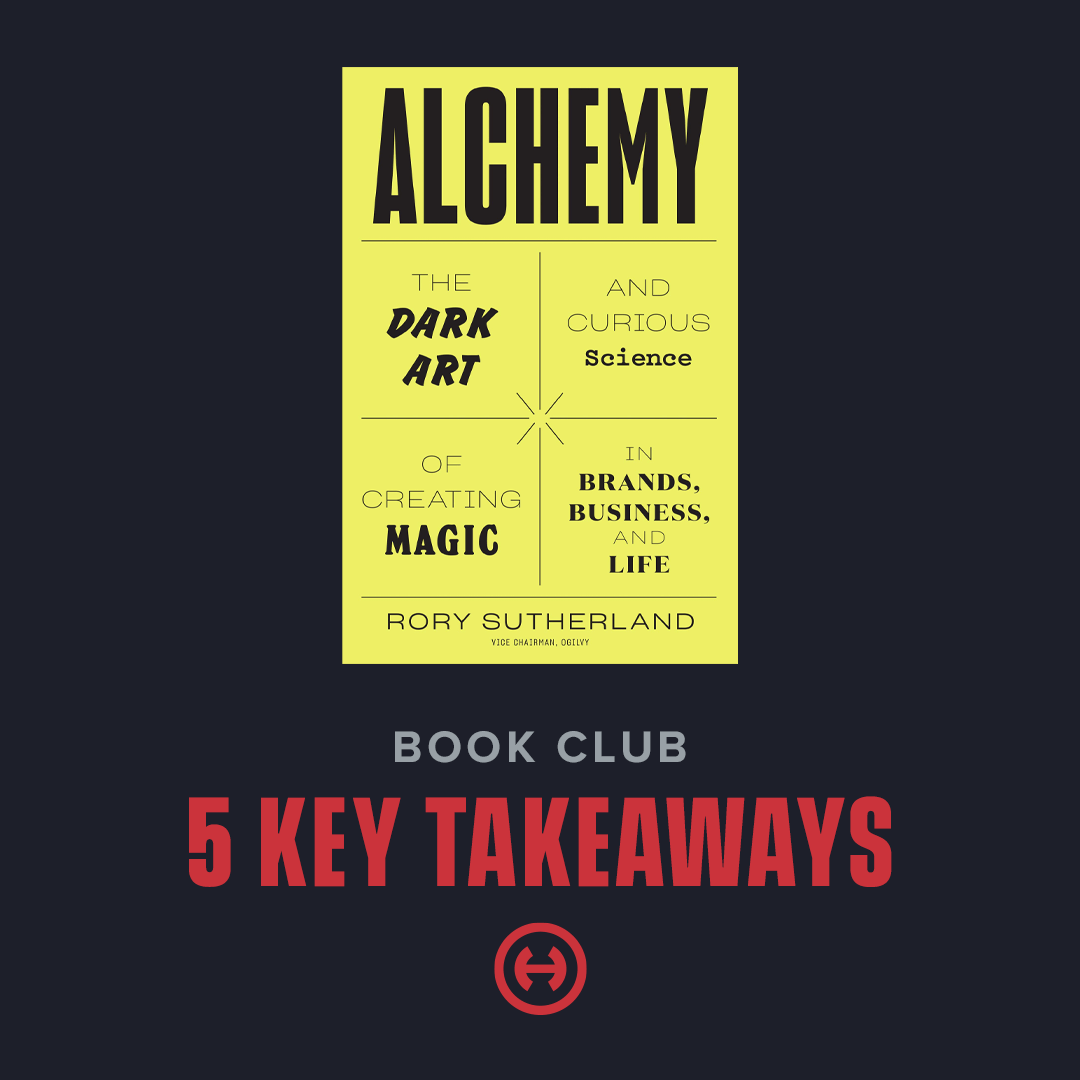While we might often attribute our favorite type of alchemy as a mixture of hops, grain, yeast and water, a recent agency book club had us exploring the magic that can be found when we make room for the silly, fantastical ideas.
Written by Ogilvy’s Vice Chairman Rory Sutherland, “Alchemy: The Dark Art and Curious Science of Creating Magic in Brands, Business, and Life” challenges us to defy critical thinking and spend time with the “obvious” questions. Many times, such questions expose fresh angles and new ways in.
If you’re intrigued and have the time to dive into case studies and research that educates and entertains, pick up a copy here. Or hit the highlights with these fast five takeaways.
1. The Opposite of a Good Idea Can Be a Good Idea
Physics may suggest otherwise, but in marketing the opposite of a good idea can be a good idea (or lead to one). Often both sides of the spectrum will work, which Sutherland demonstrates by comparing the advertising strategies for high-end luxury items and department stores like TJ Maxx.
Luxury brands like Louis Vuitton may raise the price of a product to a level that feels “reassuringly” expensive and lets customers know they’re paying a large amount of money because it’s from Louis Vuitton. On the flip side, a department store like TJ Maxx will reduce prices (and highlight price cuts on their price tags) to let consumers know that they’re getting a good deal on a product, perhaps even one from Louis Vuitton. While these approaches are seemingly opposite, they’re also extremely effective.
Consider: What is the opposite of your last great idea? How does the opposite spark another inspiring way in?
2. Hackers Prey on Predictability
Hacking in marketing may look like being outsmarted or outadvertised by a competitor – or cause your brand to look like it’s becoming boring. Hacking is most probable when you become predictable. Predictability can stem from rational thinking skills, which have their benefits, but can also limit your ability to go beyond “reasonable and safe” thinking to explore creative spaces to stay differentiated.
For this, Sutherland suggests thinking “unlike an economist,” or rather, thinking irrationally. When you embrace irrational thinking, you’re able to come up with wild (and perhaps wonderful) ideas that are out there and harder to hack.
Consider: How could weaving “impractical thinking” strategies into your collaboration process shift team dynamics and output to come up with something fresh?
3. Uncovering Our Unconscious Motivations
Digging deeper into the unconscious motivations driving human behavior will illuminate something called our “real why.” Understanding the real why makes it easier to determine what kinds of stories and product applications will resonate with your target audience.
For example, some people who call for a doctor’s appointment may simply be seeking peace of mind over treatment. Knowing peace of mind is the priority might lead a hospital or clinic to create a hotline for patients to ask questions first and then determine whether a conversation meets the need or if an appointment is necessary (vs. defaulting to an appointment).
Consider: What could a marketing campaign look like for your product or service that caters to the target’s real why? What products have you purchased only to find they didn’t meet your real need? What is one product that you buy but don’t use for its original intent?
4. A Flower Is Simply a Weed With an Advertising Budget
Flowers can begin to mimic features of other plants, such as growing bigger petals that alert the bee to signs of nectar. But if that flower doesn’t have the nectar its leaves promise, bees learn their tricks and begin to avoid the plant all together. This serves as a metaphor for how a large advertising budget or fancy campaign may not be proof of a good product, but rather simply a demonstration of confidence in the future popularity of that product. If your ads have the potential to drive repeat business, it pays to be true to your brand or product.
Consider: Have you returned to a product after the brand overpromised and underdelivered?
5. Being a Little Less Logical
Logic kills magic. If you never do anything differently, then you’ll lose your chance to enjoy happy accidents. However, people generally tend to cling to structure because it’s easier to stay in their lane vs. explore the infinite options, especially when dealing with challenges. Sutherland notes that it’s actually less important to find the fastest, most logical path or solution than it is to be able to defend your choice of a path or solution. Opting for a detour or atypical approach may help to spur magical thinking around your occasional challenges and ongoing routines.
Consider: What new solutions might your brand be able to offer for obstacles as well as everyday problems?
Excited to find your brand’s fresh perspective or examine an existing idea from every angle? Email Dana Arnold at darnold@hiebing.com to set up a call.
